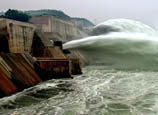
A benchmark for inter-bank borrowing costs dropped sharply Friday as a credit squeeze eased amid rumors that the country's central bank had asked major banks to release cash to the market.
The seven-day repurchase rate fell to 8.5 percent Friday from Thursday's decade-high 10.77 percent and the one-day repurchase rate also fell to 8.43 percent Friday from 12.85 percent Thursday.
The Shanghai Composite Index further declined 0.52 percent Friday, following Thursday's 2.77 percent tumble, but half of the banking stocks have recorded rises in their prices Friday despite an overall slump on Thursday.
This decline in the repurchase rate demonstrates an increase in the money supply in the market and eased market liquidity, despite it remaining tight, a macroeconomic analyst with a major domestic bank told the Global Times Friday on condition of anonymity.
He said the improved liquidity came as a result of a demand that major banks offer cash made by the People's Bank of China (PBC) Friday, as tight credit over the past weeks had caused surging inter-bank borrowing cost and triggered market panic.
The Bank of China was reported as defaulting in the inter-bank lending market Thursday but the bank denied the report later in the day.
The market expected the PBC to intervene, but it had refrained from injecting more liquidity through moves such as reverse repurchases.
It was correct to maintain a relatively tight and cautious monetary policy as US Federal Reserve Chairman Ben Bernanke Wednesday talked about his plan of tapering quantitative easing, which would lead to capital flight from economies such as China, Luo Yuding, a financial professor at the Shanghai University of Finance and Economics, told the Global Times Friday.
The bank analyst said the PBC hoped to prevent the financing scale from soaring, and to ensure steady development of credit.
This was also shown in a State Council meeting Wednesday chaired by Premier Li Keqiang, who pledged to keep monetary aggregates and liquidize money stock.
The bank analyst expressed concerns over the prospect of China's real economy.
"As the PBC tightly controls market liquidity, the real economy is expected to see a further downturn in the second and third quarters of 2013," he said.
The flash HSBC Purchasing Managers' Index declined to 48.3 in June from 49.2 in May.
Rating agency Fitch also raised concerns Friday that persistent tight liquidity could constrain some banks' ability to meet upcoming obligations while the PBC's hands-off response would increase banks' repayment risks and raise the potential of a policy misstep.
The bank analyst said the PBC should maintain a steady monetary policy and avoid intensifying market panic.
Luo said China's reserve requirement ratio - the ratio of deposits kept by banks in reserve - is as high as 20 percent, which reduces commercial banks' efficiency, and therefore suggested decreasing the ratio so that the short-term credit crunch could be overcome.
















 Water gush out of Xiaolangdi Reservoir on Yellow River
Water gush out of Xiaolangdi Reservoir on Yellow River


![]()
